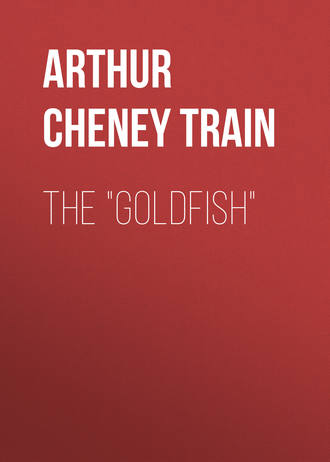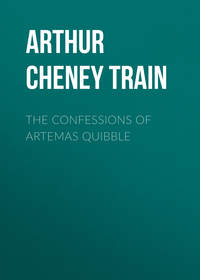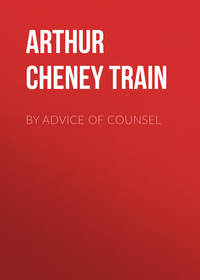 полная версия
полная версияThe "Goldfish"
To tuition $12.00
Room rent 3.00
Use of University Library 1.00
Servants' hire, printing, and so on 2.00
Repairs .80
Damage for glass .09
Commons bill, 15-1/2 weeks at $1.62 a week 25.11
Steward's salary 2.00
Public fuel .50
Absent from recitation without excuse—once .03
––
Total $46.53
The glass damage at nine cents and the three cents for absence without excuse give me joy. Father was human, after all!
Economically speaking, I do not think that his clothes cost him anything. He wore my grandfather's old ones. There were no amusements in those days, except going to see the pickled curios in the old Boston Museum. I have no doubt he drove to college in the family chaise—if there was one. I do not think that, in fact, there was.
On a conservative estimate he could not have cost my grandfather much, if anything, over a hundred dollars a year. On this basis I could, on my present income, send seven hundred and fifty fathers to college annually! A curious thought, is it not?
Undoubtedly my grandfather went barefoot and trudged many a weary mile, winter and summer, to and from the district school. He worked his way through college. He married and reared a family. He educated my father. He watched over his flock in sickness and in health, and he died at a ripe old age, mourned by the entire countryside.
My father, in his turn, was obliged to carve out his own fate. He left the old home, moved to the town where I was born, and by untiring industry built up a law practice which for those days was astonishingly lucrative. Then, as I have said, the war broke out and, enlisting as a matter of course, he met death on the battlefield. During his comparatively short life he followed the frugal habits acquired in his youth. He was a simple man.
Yet I am his son! What would he say could he see my valet, my butler, my French cook? Would he admire and appreciate my paintings, my objets d'art, my rugs and tapestries, my rare old furniture? As an intelligent man he would undoubtedly have the good taste to realize their value and take satisfaction in their beauty; but would he be glad that I possessed them? That is a question. Until I began to pen these confessions I should have unhesitatingly answered it in the affirmative. Now I am inclined to wonder a little. I think it would depend on how far he believed that my treasures indicated on my own part a genuine love of art, and how far they were but the evidences of pomp and vainglory.
Let me be honest in the matter. I own some masterpieces of great value. At the time of their purchase I thought I had a keen admiration for them. I begin to suspect that I acquired them less because I really cared for such things than because I wished to be considered a connoisseur. There they hang—my Corots, my Romneys, my Teniers, my Daubignys. But they might as well be the merest chromos. I never look at them. I have forgotten that they exist. So have the rest of my family.
It is the same way with my porcelains and tapestries. Of course they go to make up the tout ensemble of a harmonious and luxurious home, but individually they mean nothing to me. I should not miss them if they were all swept out of existence tomorrow by a fire. I am no happier in my own house than in a hotel. My pictures are nothing but so much furniture requiring heavy insurance.
It is somewhat the same with our cuisine. My food supply costs me forty dollars a day. We use the choicest teas, the costliest caviar and relishes, the richest sterilized milk and cream, the freshest eggs, the choicest cuts of meat. We have course after course at lunch and dinner; yet I go to the table without an appetite and my food gives me little pleasure. But this style of living is the concrete expression of my success. Because I have risen above my fellows I must be surrounded by these tangible evidences of prosperity.
I get up about nine o'clock in the morning unless I have been out very late the night before, in which case I rest until ten or later. I step into a porcelain tub in which my servant has drawn a warm bath of water filtered by an expensive process which makes it as clear and blue as crystal. When I leave my bath my valet hands me one by one the garments that have been carefully laid out in order. He is always hovering round me, and I rather pride myself on the fact that I lace my own shoes and brush my own hair. Then he gives me a silk handkerchief and I stroll into my upstairs sitting room ready for breakfast.
My daughters are still sleeping. They rarely get up before eleven in the morning, and my wife and I do not, as a rule, breakfast together. We have tried that arrangement and found it wanting, for we are slightly irritable at this hour. My son has already gone downtown. So I enter the chintz-furnished room alone and sit down by myself before a bright wood fire and glance at the paper, which the valet has ironed, while I nibble an egg, drink a glass of orange juice, swallow a few pieces of toast and quaff a great cup of fragrant coffee.
Coffee! Goddess of the nerve-exhausted! Sweet invigorator of tired manhood! Savior of the American race! I could not live without you! One draft at your Pyrenean fountain and I am young again! For a moment the sun shines as it used to do in my boyhood's days; my blood quickens; I am eager to be off to business—to do, no matter what.
I enter the elevator and sink to the ground floor. My valet and butler are waiting, the former with my coat over his arm, ready to help me into it. Then he hands me my hat and stick, while the butler opens the front door and escorts me to my motor. The chauffeur touches his hat. I light a small and excellent Havana cigar and sink back among the cushions. The interior of the car smells faintly of rich upholstery and violet perfume. My daughters have been to a ball the night before. If it is fine I have the landaulette hood thrown open and take the air as far as Washington Square—if not, I am deposited at the Subway.
Ten o'clock sees me at my office. The effect of the coffee has begun to wear off slightly. I am a little peevish with my secretary, who has opened and arranged all my letters on my desk. There are a pile of dividend checks, a dozen appeals for charity and a score of letters relating to my business. I throw the begging circulars into the waste-basket and dictate most of my answers in a little over half an hour. Then come a stream of appointments until lunchtime.
On the top floor of a twenty-story building, its windows commanding a view of all the waters surrounding the end of Manhattan Island, is my lunch club. Here gather daily at one o'clock most of the men with whom I am associated—bankers, railroad promoters and other lawyers. I lunch with one or more of them. A cocktail starts my appetite, for I have no desire for food; and for the sake of appearances I manage to consume an egg Benedictine and a ragout of lamb, with a dessert.
Then we wander into the smoking room and drink black coffee and smoke long black cigars. I have smoked a cigar or two in my office already and am beginning, as usual, to feel a trifle seedy. Here we plan some piece of business or devise a method of escaping the necessity of fulfilling some corporate obligation.
Two or half-past finds me in my office again. The back of the day is broken. I take things more easily. Later on I smoke another cigar. I discuss general matters with my junior partners. At half-past four I enter my motor, which is waiting at the Wall Street entrance of the building. At my uptown club the men are already dropping in and gathering round the big windows. We all call each other by our first names, yet few of us know anything of one another's real character. We have a bluff heartiness, a cheerful cynicism that serves in place of sincerity, and we ask no questions.
Our subjects of conversation are politics, the stock market, "big" business, and the more fashionable sports. There is no talk of art or books, no discussion of subjects of civic interest. After our cocktails we usually arrange a game of bridge and play until it is time to go home to dress for dinner.
Until this time, usually, I have not met my wife and daughters since the night before. They have had their own individual engagements for luncheon and in the afternoon, and perhaps have not seen each other before during the day. But we generally meet at least two or three times a week on the stairs or in the hall as we are going out. Sometimes, also, I see my son at this time.
It will be observed that our family life is not burdensome to any of us:—not that we do not wish to see one another, but we are too busy to do so. My daughters seem to be fond of me. They are proud of my success and their own position; in fact they go out in the smartest circles. They are smarter, indeed, than their mother and myself; for, though we know everybody in society, we have never formed a part of the intimate inner Newport circle. But my daughters are inside and in the very center of the ring. You can read their names as present at every smart function that takes place.
From Friday until Monday they are always in the country at week-end parties. They are invited to go to Bermuda, Palm Beach, California, Aiken and the Glacier National Park. They live on yachts and in private cars and automobiles. They know all the patter of society and everything about everybody. They also talk surprisingly well about art, music and international politics. They are as much at home in Rome, Paris and London as they are in New York, and are as familiar with Scotland as Long Island. They constantly amaze me by the apparent scope of their information.
They are women of the world in a sense unheard of by my father's generation. They have been presented at court in London, Berlin and Rome, and have had a social season at Cairo; in fact I feel at a great personal disadvantage in talking with them. They are respectful, very sweet in a self-controlled and capable sort of way, and, so far as I can see, need no assistance in looking out for themselves. They seem to be quite satisfied with their mode of life. They do as they choose, and ask for no advice from either their mother or myself.
My boy also leads his own life. He is rarely at home except to sleep. I see less of him than of my daughters. During the day he is at the office, where he is learning to be a lawyer. At wide intervals we lunch together; but I find that he is interested in things which do not appeal to me at all. Just at present he has become an expert—almost a professional—dancer to syncopated music. I hear of him as dancing for charity at public entertainments, and he is in continual demand for private theatricals and parties. He is astonishingly clever at it.
Yet I cannot imagine Daniel Webster or Rufus Choate dancing in public even in their leisure moments. Perhaps, however, it is better for him to dance than to do some other things. It is good exercise; and, to be fair with him, I cannot imagine Choate or Webster playing bridge or taking scented baths. But, frankly, it is a far cry from my clergyman grandfather to my ragtime dancing offspring. Perhaps, however, the latter will serve his generation in his own way.
It may seem incredible that a father can be such a stranger to his children, but it is none the less a fact. I do not suppose we dine together as a family fifteen times in the course of the winter. When we do so we get along together very nicely, but I find myself conversing with my daughters much as if they were women I had met casually out at dinner. They are literally "perfect ladies."
When they were little I was permitted a certain amount of decorous informality, but now I have to be very careful how I kiss them on account of the amount of powder they use. They have, both of them, excellent natural complexions, but they are not satisfied unless their noses have an artificial whiteness like that of marble. I suspect, also, that their lips have a heightened color. At all events I am careful to "mind the paint." But they are—either because of these things or in spite of them—extraordinarily pretty girls—prettier, I am forced to admit, than their mother was at their age. Now, as I write, I wonder to what end these children of mine have been born into the world—how they will assist in the development of the race to a higher level.
For years I slaved at the office—early, late, in the evenings, often working Sundays and holidays, and foregoing my vacation in the summer.
Then came the period of expansion. My accumulations doubled and trebled. In one year I earned a fee in a railroad reorganization of two hundred thousand dollars. I found myself on Easy Street. I had arrived—achieved my success. During all those years I had devoted myself exclusively to the making of money. Now I simply had to spend it and go through the motions of continuing to work at my profession.
My wife and I became socially ambitious. She gave herself to this end eventually with the same assiduity I had displayed at the law. It is surprising at the present time to recall that it was not always easy to explain the ultimate purpose in view. Alas! What is it now? Is it other than that expressed by my wife on the occasion when our youngest daughter rebelled at having to go to a children's party?
"Why must I go to parties?" she insisted.
"In order," replied her mother, "that you may be invited to other parties."
It was the unconscious epitome of my consort's theory of the whole duty of man.
CHAPTER II
MY FRIENDS
By virtue of my being a successful man my family has an established position in New York society. We are not, to be sure—at least, my wife and I are not—a part of the sacrosanct fifty or sixty who run the show and perform in the big ring; but we are well up in the front of the procession and occasionally do a turn or so in one of the side rings. We give a couple of dinners each week during the season and a ball or two, besides a continuous succession of opera and theater parties.
Our less desirable acquaintances, and those toward whom we have minor social obligations, my wife disposes of by means of an elaborate "at home," where the inadequacies of the orchestra are drowned in the roar of conversation, and which a sufficient number of well-known people are good-natured enough to attend in order to make the others feel that the occasion is really smart and that they are not being trifled with. This method of getting rid of one's shabby friends and their claims is, I am informed, known as "killing them off with a tea."
We have a slaughter of this kind about once in two years. In return for these courtesies we are invited yearly by the élite to some two hundred dinners, about fifty balls and dances, and a large number of miscellaneous entertainments such as musicales, private theatricals, costume affairs, bridge, poker, and gambling parties; as well as in the summer to clambakes—where champagne and terrapin are served by footmen—and other elegant rusticities.
Besides these chic functions we are, of course, deluged with invitations to informal meals with old and new friends, studio parties, afternoon teas, highbrow receptions and conversaziones, reformers' lunch parties, and similar festivities. We have cut out all these long ago. Keeping up with our smart acquaintances takes all our energy and available time. There are several old friends of mine on the next block to ours whom I have not met socially for nearly ten years.
We have definitely arrived however. There is no question about that. We are in society and entitled to all the privileges pertaining thereto. What are they? you ask. Why, the privilege of going to all these balls, concerts and dinners, of course; of calling the men and women one reads about in the paper by their first names; of having the satisfaction of knowing that everybody who knows anything knows we are in society; and of giving our daughters and son the chance to enjoy, without any effort on their part, these same privileges that their parents have spent a life of effort to secure.
Incidentally, I may add, our offspring will, each of them—if I am not very much mistaken—marry money, since I have observed a certain frankness on their part in this regard, which seems to point that way and which, if not admirable in itself, at least does credit to their honesty.
Now it is undubitably the truth that my wife regards our place among the socially elect as the crowning achievement—the great desideratum—of our joint career. It is what we have always been striving for. Without it we—both of us—would have unquestionably acknowledged failure. My future, my reputation, my place at the bar and my domestic life would have meant nothing at all to us, had not the grand cordon of success been thrown across our shoulders by society.
* * * * *As I have achieved my ambition in this respect it is no small part of my self-imposed task to somewhat analyze this, the chief reward of my devotion to my profession, my years of industrious application, my careful following of the paths that other successful Americans have blazed for me.
I must confess at the outset that it is ofttimes difficult to determine where the pleasure ends and work begins. Even putting it in this way, I fear I am guilty of a euphemism; for, now that I consider the matter honestly, I recall no real pleasure or satisfaction derived from the various entertainments I have attended during the last five or ten years.
In the first place I am invariably tired when I come home at night—less perhaps from the actual work I have done at my office than from the amount of tobacco I have consumed and the nervous strain attendant on hurrying from one engagement to another and keeping up the affectation of hearty good-nature which is part of my stock in trade. At any rate, even if my body is not tired, my head, nerves and eyes are distinctly so.
I often feel, when my valet tells me that the motor is ordered at ten minutes to eight, that I would greatly enjoy having him slip into the dress-clothes he has so carefully laid out on my bed and go out to dinner in my place. He would doubtless make himself quite as agreeable as I. And then—let me see—what would I do? I sit with one of my accordion-plaited silk socks half on and surrender myself to all the delights of the most reckless imagination!
Yes, what would I choose if I could do anything in the world for the next three hours? First, I think, I would like an egg—a poached egg, done just right, like a little snowball, balanced nicely in the exact center of a hot piece of toast! My mouth waters. Aunt Jane used to do them like that. And then I would like a crisp piece of gingerbread and a glass of milk. Dress? Not on your life! Where is that old smoking-jacket of mine? Not the one with Japanese embroidery on it—no; the old one. Given away? I groan aloud.
Well, the silk one will have to do—and a pair of comfortable slippers!
Where is that old brier pipe I keep to go a-fishing? Now I want a book—full of the sea and ships—of pirates and coral reefs—yes, Treasure Island; of course that's it—and Long John Silver and the Black Spot.
"Beg pardon, sir, but madam has sent me up to say the motor is waiting," admonishes my English footman respectfully.
Gone—gone is my poached egg, my pipe, my dream of the Southern Seas! I dash into my evening clothes under the solicitous guidance of my valet and hastily descend in the electric elevator to the front hall. My wife has already taken her seat in the motor, with an air of righteous annoyance, of courteously suppressed irritation. The butler is standing on the doorstep. The valet is holding up my fur coat expectantly. I am sensible of an atmosphere of sad reproachfulness.
Oh, well! I thrust my arms into my coat, grasp my white gloves and cane, receive my hat and wearily start forth on my evening's task of being entertained; conscious as I climb into the motor that this curious form of so-called amusement has certain rather obvious limitations.
For what is its raison d'être? It is obvious that if I know any persons whose society and conversation are likely to give me pleasure I can invite them to my own home and be sure of an evening's quiet enjoyment. But, so far as I can see, my wife does not invite to our house the people who are likely to give either her or myself any pleasure at all, and neither am I likely to meet such people at the homes of my friends.
The whole thing is a mystery governed by strange laws and curious considerations of which I am kept in utter ignorance; in fact, I rarely know where I am going to dine until I arrive at the house. On several occasions I have come away without having any very clear idea as to where I have been.
"The Hobby-Smiths," my wife will whisper as we go up the steps. "Of course you've heard of her! She is a great friend of Marie Van Duser, and her husband is something in Wall Street."
That is a comparatively illuminating description. At all events it insures some remote social connection with ourselves, if only through Miss Van Duser and Wall Street. Most of our hosts are something in Wall Street. Occasionally they are something in coal, iron, oil or politics.
I find a small envelope bearing my name on a silver tray by the hatstand and open it suspiciously as my wife is divested of her wraps. Inside is a card bearing in an almost illegible scrawl the words: Mrs. Jones. I hastily refresh my recollection as to all the Joneses of my acquaintance, whether in coal, oil or otherwise; but no likely candidate for the distinction of being the husband of my future dinner companion comes to my mind. Yet there is undoubtedly a Jones. But, no! The lady may be a divorcée or a widow. I recall no Mrs. Jones, but I visualize various possible Miss Joneses—ladies very fat and bursting; ladies scrawny, lean and sardonic; facetious ladies; heavy, intelligent ladies; aggressive, militant ladies.
My spouse has turned away from the mirror and the butler has pulled back the portières leading into the drawing room. I follow my wife's composed figure as she sweeps toward our much-beplumed hostess and find myself in a roomful of heterogeneous people, most of whom I have never seen before and whose personal appearance is anything but encouraging.
"This is very nice!" says our hostess—accent on the nice.
"So nice of you to think of us!" answers my wife.
We shake hands and smile vaguely. The butler rattles the portières and two more people come in.
"This is very nice!" says the hostess again—accent on the is.
It may be here noted that at the conclusion of the evening each guest murmurs in a simpering, half-persuasive yet consciously deprecatory manner—as if apologizing for the necessity of so bald a prevarication—"Good-night! We have had such a good time! So good of you to ask us!" This epilogue never changes. Its phrase is cast and set. The words may vary slightly, but the tone, emphasis and substance are inviolable. Yet, disregarding the invocation good-night! the fact remains that neither have you had a good time nor was your host in any way good or kind in asking you.
Returning to the moment at which you have made your entrance and been received and passed along, you gaze vaguely round you at the other guests, greeting those you know with exaggerated enthusiasm and being the conscious subject of whispered criticism and inquiry on the part of the others. You make your way to the side of a lady whom you have previously encountered at a similar entertainment and assert your delight at revamping the fatuous acquaintanceship. Her facetiousness is elephantine, but the relief of conversation is such that you laugh loudly at her witticisms and simper knowingly at her platitudes—both of which have now been current for several months.
The edge of your delight is, however, somewhat dulled by the discovery that she is the lady whom fate has ordained that you shall take in to dinner—a matter of which you were sublimely unconscious owing to the fact that you had entirely forgotten her name. As the couples pair off to march to the dining room and the combinations of which you may form a possible part are reduced to a scattering two or three, you realize with a shudder that the lady beside you is none other than Mrs. Jones—and that for the last ten minutes you have been recklessly using up the evening's conversational ammunition.
With a sinking heart you proffer your arm, wondering whether it will be possible to get through the meal and preserve the fiction of interest. You wish savagely that you could turn on her and exclaim honestly:





